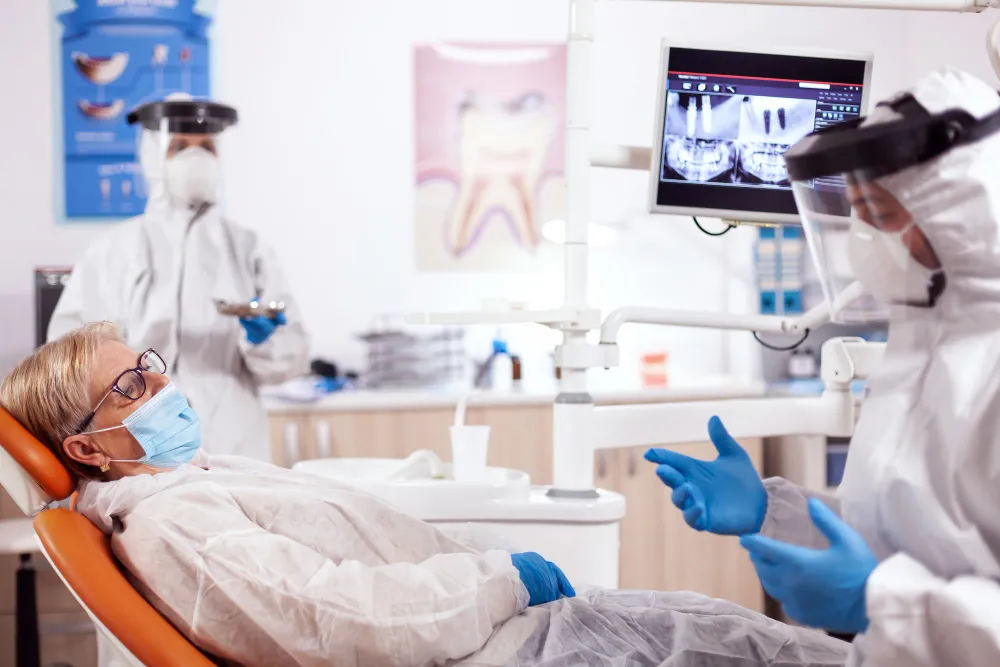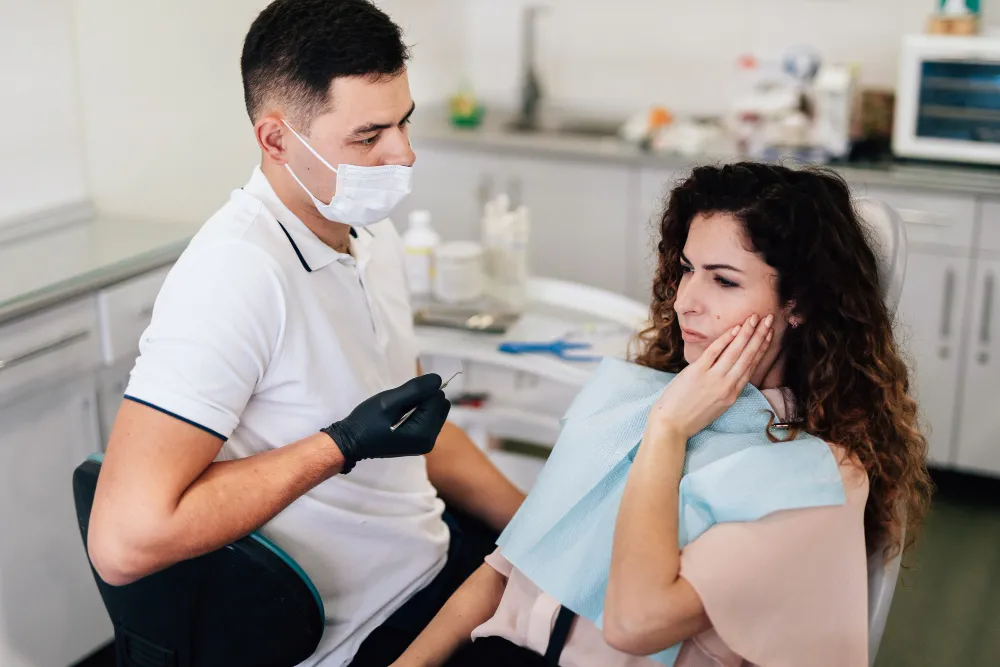How to Handle a Dental Emergency at Home Until You See a Dentist
Dental emergencies can strike at any time, causing pain, discomfort, and worry. Whether it’s a knocked-out tooth, a severe toothache, or a broken dental appliance, knowing how to manage a dental emergency at home can make all the difference in preventing further damage and relieving pain until you can see a dentist. At Katy Lakes Dentistry, we understand how stressful dental emergencies can be, and we’re here to guide you through the steps to take before you arrive at our office.
In this comprehensive guide, we’ll discuss how to handle the most common dental emergencies at home, offer tips for managing pain and preventing further damage, and explain when it’s critical to seek immediate care. Being prepared and knowing what to do in a dental emergency can help you stay calm and protect your oral health.

What Is Considered a Dental Emergency?
Not every dental issue requires emergency care, but certain situations do. A dental emergency typically involves severe pain, damage to a tooth, or a risk of permanent tooth loss. Common dental emergencies include:
- Severe toothache
- Knocked-out tooth
- Cracked or chipped tooth
- Broken dental appliance (e.g., braces, dentures)
- Object stuck between teeth
- Lost filling or crown
- Abscess or infection
If you’re unsure whether your situation qualifies as an emergency, it’s always better to err on the side of caution and contact your dentist. At Katy Lakes Dentistry, we’re available to provide guidance and emergency care to help you preserve your smile.
How to Handle Common Dental Emergencies at Home
Here’s how to manage some of the most common dental emergencies at home until you can see your dentist:
1. Severe Toothache
A toothache can range from mild discomfort to severe, throbbing pain, and it can be caused by various issues, such as decay, an abscess, or gum disease.
What to Do:
- Rinse your mouth with warm saltwater to help reduce inflammation and clean the affected area.
- Gently floss around the tooth to remove any food particles or debris that may be causing the pain.
- Apply a cold compress to the outside of your cheek to reduce swelling and numb the area.
- Take over-the-counter pain relievers such as ibuprofen or acetaminophen to manage the pain. Avoid placing aspirin directly on the tooth or gums, as it can cause irritation.
- Contact your dentist for an emergency appointment, especially if the pain persists for more than 24 hours or is accompanied by fever or swelling.
2. Knocked-Out Tooth
A knocked-out tooth is one of the most serious dental emergencies, but if handled quickly and correctly, it’s possible to save the tooth.
What to Do:
- Find the tooth and handle it by the crown (the chewing surface), not the root. Touching the root can damage the delicate cells needed for reattachment.
- Rinse the tooth gently with water if it’s dirty, but avoid scrubbing or using soap.
- Try to reinsert the tooth into its socket if possible. Hold it in place by biting down gently on a piece of gauze or cloth.
- If you can’t reinsert the tooth, store it in a container of milk or keep it inside your cheek to keep it moist. Avoid storing it in water.
- Seek immediate dental care, as the chances of saving the tooth are highest within the first hour of it being knocked out.
3. Cracked or Chipped Tooth
A cracked or chipped tooth may not always cause pain, but it’s still important to see a dentist as soon as possible to prevent further damage.
What to Do:
- Rinse your mouth with warm water to clean the area.
- If there’s swelling, apply a cold compress to the outside of your cheek to reduce it.
- Save any broken pieces of the tooth and bring them to your dental appointment.
- If the tooth is sharp or jagged, you can apply dental wax or sugarless gum to the edges to prevent it from cutting your mouth.
- Contact your dentist for an appointment to assess the damage and discuss treatment options, such as a dental crown or bonding.
4. Broken or Loose Dental Appliance
If you have braces, a retainer, or dentures, and one of these appliances breaks or becomes loose, it can cause discomfort and even injury to your gums or soft tissues.
What to Do:
- If a bracket or wire from your braces breaks, use orthodontic wax to cover any sharp edges and prevent irritation. Do not attempt to fix it yourself.
- For broken dentures, avoid using any glue or adhesive to repair them at home, as this can cause more damage.
- Contact your dentist or orthodontist to have the appliance repaired or adjusted.
5. Object Stuck Between Teeth
If something gets stuck between your teeth, it can cause pain and irritation. Common culprits include popcorn kernels, seeds, or other small, hard foods.
What to Do:
- Gently floss around the area to dislodge the object. Be careful not to force the floss or push the object further into the gums.
- Rinse your mouth with warm water to help remove any remaining debris.
- If the object doesn’t come out, contact your dentist for help. Never use sharp objects like pins or toothpicks to remove the item, as this can cause injury.
6. Lost Filling or Crown
If a filling or crown falls out, it can leave the tooth exposed and vulnerable to damage or infection.
What to Do:
- Keep the crown and bring it with you to your dental appointment.
- Apply dental cement (available at most pharmacies) to the tooth to temporarily protect it and prevent sensitivity. Avoid using household glue.
- Contact your dentist as soon as possible to have the filling or crown replaced.
7. Abscess
An abscess is a serious dental infection that can form at the root of a tooth or in the gums. It can cause severe pain, swelling, and fever, and it requires immediate treatment.
What to Do:
- Rinse your mouth with saltwater to help reduce bacteria and soothe the affected area.
- Apply a cold compress to the outside of your face to reduce swelling.
- Take over-the-counter pain relievers to manage discomfort.
- Seek emergency dental care as soon as possible, as abscesses can lead to serious health complications if left untreated.
When to Seek Immediate Emergency Dental Care
While many dental emergencies can be managed at home temporarily, some situations require immediate attention. If you experience any of the following symptoms, you should seek emergency dental care right away:
- Severe, persistent pain that doesn’t improve with pain relievers
- Swelling in the face, gums, or jaw
- Bleeding that doesn’t stop after applying pressure
- A knocked-out tooth
- Signs of infection, such as fever, pus, or a bad taste in your mouth
At Katy Lakes Dentistry, we offer emergency dental services to help you get relief and protect your oral health as quickly as possible.

Preventing Dental Emergencies
While some dental emergencies are unavoidable, there are steps you can take to reduce the risk of common issues:
- Practice good oral hygiene by brushing twice a day, flossing daily, and visiting your dentist regularly for cleanings and checkups.
- Wear a mouthguard during sports or other physical activities to protect your teeth from injury.
- Avoid chewing on hard objects such as ice, popcorn kernels, or pens, which can crack or chip teeth.
- Address dental problems early to prevent them from becoming emergencies. If you notice a toothache or sensitivity, don’t wait to schedule a dental visit.
Contact Katy Lakes Dentistry for Emergency Care
If you’re facing a dental emergency, don’t panic. The team at Katy Lakes Dentistry is here to provide prompt, expert care to relieve your pain and restore your oral health. Whether you’ve suffered a traumatic injury or are dealing with severe tooth pain, we’ll work quickly to address the problem and offer the treatment you need.
Don’t wait—call us at (832) 913-1772 to schedule an emergency appointment or visit our office for immediate care. We’re here to help you smile again.